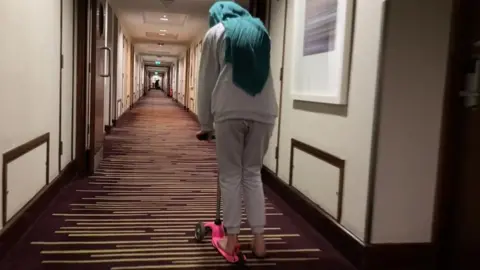Asylum: 200 children living in Northern Ireland hotels
 Xesai / Getty Images
Xesai / Getty ImagesAbout 200 asylum-seeking children are living in hotels in Northern Ireland run by the UK Home Office contractor Mears.
Overall there were approximately 1,200 asylum seekers living in hotels run by the organisation during May.
Two rights organisations in Northern Ireland have criticised the treatment of children and their families.
They described the accommodation provided as "cruel, unnecessary and avoidable".
A Belfast GP has also previously said that many are living without access to basic necessities and need greater support.
But in a statement to BBC News NI Mears said that feedback from "service users" in the hotels was "generally positive".
Mears is the private contractor that houses asylum seekers for the UK Home Office, including in Northern Ireland.
"Due to the rise in the number of people seeking asylum, hotels are being used as contingency accommodation by the Home Office across the UK, including in Northern Ireland," the statement from Mears continued.
"Mears' role, as contractor to the Home Office, is to place service users and support them while in accommodation.
"We are working very closely and positively with local authorities and with other partners, including health and welfare teams and NGOs to provide support to our service users in hotels."
However, the human rights organisation Participation and the Practice of Rights (PPR) has criticised the use of hotels to house large numbers of asylum seekers.
The Children's Law Centre (CLC) and South Tyrone Empowerment Programme (STEP) have also said they are "deeply concerned about the lived circumstances of asylum seeker children and their families" in the hotels.
In a submission to the Council of Europe's Advisory Committee on the Framework Convention for the Protection of National Minorities, CLC and STEP made a number of criticisms about conditions.
"As the living spaces are generally very small, families are often split up amongst several different rooms, at times even on different floors," the submission said.
"Despite acknowledgement that this type of accommodation should only be used as a last resort and for very short periods of time, some children and families are being held in temporary hotel accommodation for 4-6 months with obvious impacts on their health, wellbeing and enjoyment of rights."
The CLC and STEP said their submission was based on information from a range of organisations and some hotel residents.
"The children living in contingency accommodation in Northern Ireland are almost exclusively non-European and non-white," it said.
"They include Kurdish, Jordanian, Iranian, Syrian, Turkish, Somalian, South Sudanese and Libyan families.
"They experience a significantly more restrictive, and less supportive, asylum process than that which has been put in place for new arrivals from Ukraine."
'Oppressive and chaotic'
The CLC and STEP submission raised a range of issues including the food provided to families, a lack of education for some children and the lack of any space for children to play.
They also said that families had reported not having enough nappies for babies and that some families of up to eight people were living in one or two small rooms.
"A number of agencies told us the atmosphere in the main family hotel is 'oppressive and chaotic'," the submission said.
"It is ill considered to place so many families with experiences of complex trauma in this living environment together for prolonged periods of time."
A support worker from an external agency quoted in the submission described the hotels as "a powder keg of tension and it's only growing".
The CLC and STEP said that families had also faced delays in getting "basic financial entitlements" of £8 per person per week.
"They have no other independent means of acquiring income and are not permitted to work in Northern Ireland while awaiting outcome of their asylum claim," the submission said.
PPR, Conway Education Centre in west Belfast, Barnardo's Northern Ireland and South Belfast Sure Start have endorsed the submission by CLC and STEP.

But in a statement to BBC News NI, Mears countered some of the claims in the CLC and STEP submission.
They confirmed that around 1,200 asylum seekers including 200 children were living in "Initial Accommodation arrangements" run by them in Northern Ireland.
"As the exact number of service users we are accommodating and the number of units and types of accommodation changes on a daily basis, we do not provide a running commentary," they said.
Mears said that they provided three meals a day including fruit and milk as well as access to baby milk and baby food.
"While some items need to be requested, no items are restricted," Mears said.
"Mears aims to accommodate service users in the most appropriate accommodation and we prioritise larger families for homes in the community.
"There is a shortage of suitable housing and moves are made as soon as possible.
"While families are in Initial Accommodation, we use larger rooms and adjacent rooms where possible.
"In hotels, families have access to communal areas including dining areas and sitting areas.
"Mears seeks feedback from service users and staff on a weekly basis.
"Feedback is generally positive and we make changes and improvements where appropriate."
Mears also uses hotels to house asylum seekers elsewhere in the UK on behalf of the Home Office.
An Iranian woman whose family were moved from Belfast to Londonderry recently told BBC Radio Foyle that the asylum system had caused distress to her children.
After 10 months living in temporary accommodation in Belfast, the family were moved at short notice which meant her children were forced to leave schools they had been attending.
